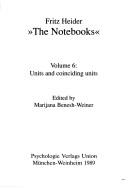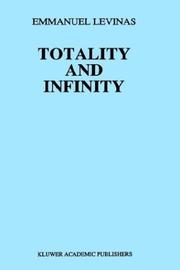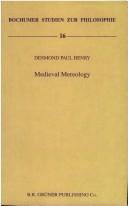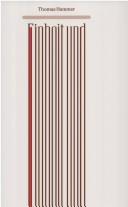| Listing 1 - 10 of 59 | << page >> |
Sort by
|

ISBN: 3621547169 9783621547161 Year: 1990 Publisher: München: Psychologie Verlags Union,
Abstract | Keywords | Export | Availability | Bookmark
 Loading...
Loading...Choose an application
- Reference Manager
- EndNote
- RefWorks (Direct export to RefWorks)
Whole and parts (Psychology) --- Ganzheit (Psychology) --- Structure psychology --- Wholeness --- Gestalt psychology --- Perception --- Psychology
Book
ISBN: 0585092648 9780585092645 1438422792 9781438422794 Year: 1982 Publisher: Albany State University of New York Press
Abstract | Keywords | Export | Availability | Bookmark
 Loading...
Loading...Choose an application
- Reference Manager
- EndNote
- RefWorks (Direct export to RefWorks)
Religion --- Whole and parts (Philosophy) --- Ganzheit (Philosophy) --- Mereology --- Totality (Philosophy) --- Unity (Philosophy) --- Wholeness --- Categories (Philosophy) --- Philosophy.
Book
ISBN: 0198249543 9780198249542 Year: 1987 Publisher: Oxford : Clarendon press,
Abstract | Keywords | Export | Availability | Bookmark
 Loading...
Loading...Choose an application
- Reference Manager
- EndNote
- RefWorks (Direct export to RefWorks)
Whole and parts (Philosophy) --- Tout et parties (Philosophie) --- Ganzheit (Philosophy) --- Mereology --- Totality (Philosophy) --- Unity (Philosophy) --- Wholeness --- Categories (Philosophy) --- Whole and parts (Philosophy).

ISBN: 9024722888 9400993447 9400993420 9789024722884 Year: 1979 Volume: 1 Publisher: The Hague: Nijhoff,
Abstract | Keywords | Export | Availability | Bookmark
 Loading...
Loading...Choose an application
- Reference Manager
- EndNote
- RefWorks (Direct export to RefWorks)
Infinite --- Phenomenology --- Whole and parts (Philosophy) --- Ganzheit (Philosophy) --- Mereology --- Totality (Philosophy) --- Unity (Philosophy) --- Wholeness --- Infinity --- Categories (Philosophy) --- Philosophy, Modern --- Finite, The
Book
ISBN: 1282295861 9786612295867 3110212358 9783110212358 311021234X 9783110212341 9781282295865 9783110212341 Year: 2009 Publisher: Berlin New York W. de Gruyter
Abstract | Keywords | Export | Availability | Bookmark
 Loading...
Loading...Choose an application
- Reference Manager
- EndNote
- RefWorks (Direct export to RefWorks)
Die Frage nach der Einheit ist ein Grundproblem der Ontologie, denn die Art und Weise, wie Einheit bestimmt wird, charakterisiert und prägt jede Ontologie. Ein spezifisch ontologischer Zugang hat dabei beträchtliche Implikationen, die weit über den Bereich der theoretischen Ontologie hinaus Folgen für die Behandlung anthropologischer, ethischer und auch theologischer Fragen haben. Das Problem der Einheit, ihrer Kriterien und ihrer Erscheinungsweisen stellt sich für die Autoren dieses philosophischen Sammelbands in mehrfacher Hinsicht. Besondere Kontroversen löst vor allem die Frage nach der temporalen Einheit aus. Gibt es Einheit durch die Zeit? Wie plausibel ist die Annahme von "endurers"? Ist die Überzeugung, dass Personen durch ihre Lebenszeit hindurch dieselben bleiben, begründbar, oder ist diese Überzeugung nur ein lebensweltliches Vorurteil, das korrigiert werden muss? Welche Rolle spielen die Begriffe der Potenzialität, der Vermögen und Dispositionen in diesem Zusammenhang? Kann die (zeitliche) Einheit von Entitäten mit Hilfe dieser Begriffe ontologisch gedeutet werden?
Whole and parts (Philosophy) --- Time --- Change --- Hours (Time) --- Geodetic astronomy --- Nautical astronomy --- Horology --- Ganzheit (Philosophy) --- Mereology --- Totality (Philosophy) --- Unity (Philosophy) --- Wholeness --- Categories (Philosophy) --- Philosophy --- Ontology --- Catastrophical, The

ISBN: 1283328224 9786613328229 9027277990 9789027277992 9060323181 9789060323182 9781283328227 6613328227 Year: 1991 Publisher: Amsterdam Philadelphia B.R. Grüner
Abstract | Keywords | Export | Availability | Bookmark
 Loading...
Loading...Choose an application
- Reference Manager
- EndNote
- RefWorks (Direct export to RefWorks)
Mereology is the theory which deals with parts and wholes in the concrete sense, and this study follows its varied fortunes during the Middle Ages. Preliminary indications as to its metaphysical situation are followed by a brief sketch of Boethius' contribution. Peter Abelard, Gilbert of Poitiers, Clarembald of Arras, and Joscelin of Soissons are among the twelfth-century authors examined. The effect of the subsequent recovery of Aristotle's Metaphysica on Mereology is typified by sketches of the many and varied uses made of the latter by Aquinas. A brief sample of Buridanian treatment
Whole and parts (Philosophy) --- Logic, Medieval. --- Ontology --- Medieval logic --- Ganzheit (Philosophy) --- Mereology --- Totality (Philosophy) --- Unity (Philosophy) --- Wholeness --- Categories (Philosophy) --- History. --- Whole and parts (Philosophy) - History. --- Ontology - History.

ISBN: 3884795910 Year: 1991 Publisher: Würzburg : Königshausen und Neumann,
Abstract | Keywords | Export | Availability | Bookmark
 Loading...
Loading...Choose an application
- Reference Manager
- EndNote
- RefWorks (Direct export to RefWorks)
Whole and parts (Philosophy) --- -Ganzheit (Philosophy) --- Mereology --- Totality (Philosophy) --- Unity (Philosophy) --- Wholeness --- Categories (Philosophy) --- History --- Heraclitus of Ephesus --- History. --- -History --- Ganzheit (Philosophy) --- Heraclitus, --- Eraclito, --- Geraklit, --- Heracleitus, --- Heraclit, --- Héraclite, --- Heraclito --- Hērakleitos, --- Heraklit, --- Herakʻŭlleitʻosŭ --- Kheraklit, --- היראקליטוס --- Ἡράκλειτος, --- Heraclitus --- Héraclite --- Heraclitus van Efese --- Heraclitus van Ephese --- Herakleitos --- Eraclito --- Heraclitus Ephesius,
Book
ISBN: 9780892369263 0892369264 Year: 2009 Publisher: Los Angeles, Calif. Getty Publications
Abstract | Keywords | Export | Availability | Bookmark
 Loading...
Loading...Choose an application
- Reference Manager
- EndNote
- RefWorks (Direct export to RefWorks)
"The universe may well have begun with an immense act of fragmentation, "the big bang," that sent particles flying in all directions to perform spectacular acts of creation and destruction. The fragment, volatile and unpredictable, is not simply a static part of a once-whole thing but itself something in motion. Drawing upon art history, archaeology, literature, numismatics, philosophy, and film, this book explores the significance of the fragment and addresses the powerful drives that have impelled it into the cultural mainstream."--Jacket.
Art
---
Whole and parts (Philosophy)
---
Whole and parts (Philosophy).
---
Fragment
---
Kunst
---
Kongress
---
Los Angeles
Book
ISBN: 2872691324 9782872691326 Year: 2002 Volume: 25 Publisher: Bruxelles: Bernard Gilson,
Abstract | Keywords | Export | Availability | Bookmark
 Loading...
Loading...Choose an application
- Reference Manager
- EndNote
- RefWorks (Direct export to RefWorks)
Consciousness --- Whole and parts (Philosophy) --- 843 --- Literature French fiction --- Ganzheit (Philosophy) --- Mereology --- Totality (Philosophy) --- Unity (Philosophy) --- Wholeness --- Categories (Philosophy) --- Consciousness - Congresses. --- Whole and parts (Philosophy) - Congresses. --- Whole and parts (Philosophy) - Congresses
Book
ISBN: 3772822134 9783772822131 Year: 2004 Volume: 49 Publisher: Stuttgart: Frommann-Holzboog,
Abstract | Keywords | Export | Availability | Bookmark
 Loading...
Loading...Choose an application
- Reference Manager
- EndNote
- RefWorks (Direct export to RefWorks)
Whole and parts (Philosophy) --- Liberty --- Reinhold, Karl Leonhard, --- Ganzheit (Philosophy) --- Mereology --- Totality (Philosophy) --- Unity (Philosophy) --- Wholeness --- Categories (Philosophy) --- Civil liberty --- Emancipation --- Freedom --- Liberation --- Personal liberty --- Democracy --- Natural law --- Political science --- Equality --- Libertarianism --- Social control --- Reinhold, Karl Leonhard, - 1758-1823
| Listing 1 - 10 of 59 | << page >> |
Sort by
|

 Search
Search Feedback
Feedback About UniCat
About UniCat  Help
Help News
News